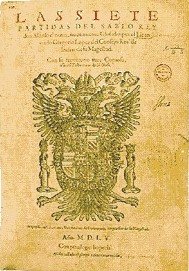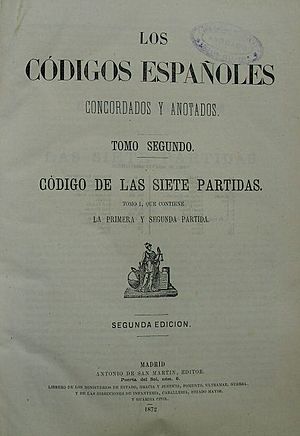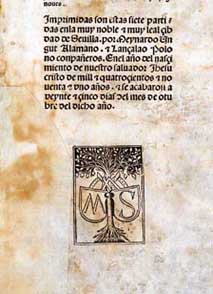Siete Partidas facts for kids
The Siete Partidas (pronounced SYEH-teh par-TEE-das), also known as the Seven-Part Code, or just Partidas, was a very important set of laws from the old Kingdom of Castile in Spain. It was first put together during the time of King Alfonso X of Castile (who ruled from 1252 to 1284). The main goal was to create a single, clear set of rules for everyone in the kingdom.
This collection of laws was first called the Libro de las Leyes (which means "Book of Laws"). It got its current name, Siete Partidas, in the 1300s because it is divided into seven main sections.
The Partidas was also very important in Latin America. People followed these laws for hundreds of years, right up until the 1800s. Even though it's mostly about laws, it's also like a "humanist encyclopedia." It talks about big ideas like philosophy, good and bad choices (morality), and religious beliefs. It even includes old Greco-Roman and Judeo-Christian ideas about war.
Contents
- How the Partidas Was Created
- What Influenced the Partidas?
- What's Inside the Partidas?
- What a Law-Maker Should Be
- Why People Can't Say They Didn't Know the Laws
- What a Tyrant Is
- What the Word "People" Means
- Four Virtues for Knights
- What a Squire Should Do Before Becoming a Knight
- Where a School Should Be and How Students Should Be Safe
- Marriage and Property Rules
- Rules for Innkeepers and Sailors
- Different Versions of the Partidas
- Why the Partidas Was So Important
- English Translation
- See also
How the Partidas Was Created
Who Wrote the Siete Partidas?
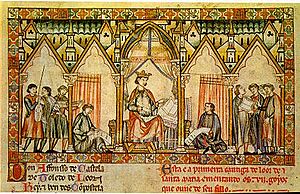
One of the oldest versions of the Partidas says it was written between 1256 and 1265. It was put together by a group of the best legal experts in Castile. King Alfonso X himself guided this group. Most historians agree it was finished around 1265.
Many historians believe that a group of legal scholars wrote the Siete Partidas. King Alfonso X probably set the main goals and topics for the book. He also reviewed and changed their work. This group might have included Master Jacobo, a legal scholar, and Juan Alfonso, a notary from León.
For a long time, in the 1700s, people thought King Alfonso X wrote the entire Partidas himself. However, there's been a lot of discussion about who truly wrote the works linked to Alfonso X. Other texts from that time, like el Setenario and Fuero Real, are very similar to the Partidas.
In the 1950s, a scholar named Alfonso García-Gallo suggested that the Partidas was not finished during Alfonso X's reign. He thought it was written later, in the 1300s, and was a new version of an earlier text called the Espéculo. He pointed out that the first clear mentions of the Partidas in other writings appeared in the early 1300s.
Even with these debates, King Alfonso X is still usually given credit for the Siete Partidas. This is because it was common for big projects like this to be named after the king who ordered them. This happened even if the king didn't write every word himself.
Why Was the Partidas Written?
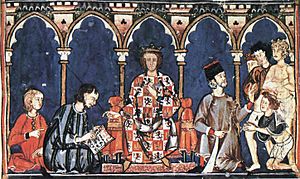
Even though the Partidas talks a lot about philosophical ideas, many people believe it was meant to be a book of laws. The introduction to the book says it was created to help judges make legal decisions.
However, some scholars, like García-Gallo, argued that the Siete Partidas was not used much for over a century after it was written. The nobles in Castile didn't like it much. So, in 1274, the Cortes (the legislature) passed new laws called the Ordinances of Zamora. These laws limited the use of the Partidas to only special cases that the king handled. Other matters were still decided by local laws.
It wasn't until King Alfonso XI officially approved the Partidas in 1348 that it became widely used. This is why some historians call it a "late enactment."
Some people think King Alfonso X created the Siete Partidas because he wanted to become the Holy Roman Emperor. They believe he wanted a set of laws that would work for a huge empire. However, the Partidas itself doesn't mention anything about him wanting to be emperor. Also, it was written in Spanish, not Latin, which was the language of the empire.
Most people now believe that King Alfonso X wanted to unite the legal system of his own kingdom. Instead of giving different local laws to different areas, he wanted one general code for the whole country. He also wanted to make Castilian Spanish the common language of his kingdom. He supported the scholars and jurists who wrote the Siete Partidas to help achieve this.
When Did the Partidas Become Law?
It's not clear if King Alfonso X officially made the Siete Partidas a law during his rule. Some think he did, but that his son, Sancho IV of Castile, stopped its use when he took the throne. Others believe that Sancho IV's family might have hidden the document that made it law. This is because the Partidas had rules about who could inherit the throne that might have challenged their right to rule.
What is certain is that the Partidas definitely became official law under King Alfonso XI. This happened in 1348, when it was included in the Ordenamiento de Alcalá. This is why many historians say it was "late enacted" if they don't believe Alfonso X made it law himself.
What Influenced the Partidas?
The Siete Partidas is a type of civil law text. It was heavily influenced by Roman law (especially the Corpus Iuris Civilis of Justinian) and canon law (church law). It also had some ideas from feudal laws and even a little from Islamic law.
Many different sources were used to create it. Some of the most important include:
- The works of Roman legal scholars like Franciscus Accursius.
- Church law texts, such as the rules from Gregory IX and the writings of Saint Raimundo de Peñafort.
- An Islamic legal book called Villiyet from Islamic Spain.
- Some local Castilian laws and customs.
Other influences came from philosophical books by Aristotle and Seneca. The Bible and writings by early Christian thinkers were also used. Works by Isidore of Seville and Thomas Aquinas were important too. The Libri Feudorum (a collection of feudal laws) and the Roles D´Olerons (about business law) also played a part. Legal manuals by Maestro Jacobo, who helped write the Partidas, were also sources.
What's Inside the Partidas?
The Partidas brings together all the legal knowledge of its time into one big book. It was seen as the highest authority for solving legal problems. It covers many different areas of law, including:
- Rules about government (constitutional law).
- Laws for everyday people (civil law).
- Business laws (commercial law).
- Laws about crimes (criminal law).
- Rules for court cases (trial law).
The book is written in a beautiful, literary Spanish style. It starts with a Prologue that explains what the book is about. Then, it has seven main parts, called partidas. Each partida begins with a letter from King Alfonso's name, spelling out 'Alfonso' as an acrostic:
- A seruicio de Dios... (For the service of God...)
- La ffe cathólica... (The Catholic faith...)
- Fizo Nuestro Sennor Dios... (Our Lord God did...)
- Onras sennaladas... (Special rites...)
- Nascen entre los ommmes... (Among men there arise...)
- Sesudamente dixeron... (The ancient wise men sagely said...)
- Oluidança et atreuimiento... (Forgetfulness and boldness...)
Each partida is divided into smaller sections called articles (there are 182 in total). These articles are then made up of laws (2802 laws in all).
The laws often include references to other writers or texts. They also use stories and examples. Most importantly, they explain the reasons behind the laws. They talk about their history, their religious meaning, and their philosophical ideas. This is because they weren't just meant to be simple rules.
Sometimes, different parts of the Partidas might seem to contradict each other. This happened because different people wrote different partidas.
Here are some examples of the kinds of laws and ideas found in the Partidas:
What a Law-Maker Should Be
The Partidas says that a law-maker should love God and always think of Him when making laws. This helps make sure the laws are fair and perfect. A law-maker should also love justice and want what's best for everyone. They should be smart enough to know right from wrong. They should also not be afraid to change or fix laws if they realize they are wrong. It's important for someone who corrects others to be able to correct themselves too.
Why People Can't Say They Didn't Know the Laws
No one can avoid punishment by saying they didn't know the laws. Laws are there to protect people and make sure justice is done. So, it's fair that people should know them. They can learn the laws by reading them or by hearing them explained. People have excuses for many things, but not for not knowing the laws. If they can't go to court themselves, they should send someone else to represent them. Since they can defend themselves or have someone else do it, they can't say they didn't know the laws.
What a Tyrant Is
A tyrant is a ruler who takes control of a kingdom or country by force, trickery, or betrayal. Tyrants usually act for their own benefit, even if it hurts the country. They do this because they are always afraid of losing power. To keep their power, ancient wise men said tyrants use three main tricks:
- First, they try to keep their people uneducated and scared. This way, people won't dare to rise up against them.
- Second, they cause arguments among the people so they don't trust each other. When people are fighting among themselves, they won't dare to speak against the ruler.
- Third, they try to make people poor and keep them very busy with hard work. This way, people are too focused on their own problems to think about fighting the tyrant.
Tyrants also try to take wealth from powerful people and kill wise people. They forbid groups or clubs in their lands. They always try to find out what people are saying or doing. They trust outsiders more than their own people because outsiders serve them willingly. The Partidas states that even if a ruler gained power lawfully, if they use it badly like a tyrant, people can call them a tyrant. Their rule, which was once lawful, becomes wrong.
What the Word "People" Means
Some people think "people" only means common folk, like workers or farmers. But this is not true. In ancient, famous cities like Babylon, Troy, and Rome, the word "people" meant everyone together. This included people of high, middle, and low rank. All are needed, and none can be left out. This is because everyone needs to help each other to live well, be safe, and be supported.
Four Virtues for Knights
The Partidas says that knights should have four main virtues:
- Prudence: This helps them act wisely and avoid harm.
- Fortitude: This makes them strong and steady in their actions.
- Temperance: This helps them do their duties properly without going too far.
- Justice: This guides them to act fairly and do what is right.
These virtues are important for everyone, but especially for knights. Knights protect the Church, the monarchs, and everyone else. The Partidas compares parts of a sword to these virtues. The hilt (handle) shows prudence, the pommel (end of the hilt) shows fortitude, the guard shows temperance, and the straight, sharp blade shows justice. Knights were given swords to remind them of these four virtues, which they needed to be good protectors.
What a Squire Should Do Before Becoming a Knight
The Partidas says that cleanliness and elegance are important. Knights should be pure, not just in their actions but also in how they look. Even though their job involves wounds and death, their minds should appreciate beauty. Looking good can make them happy and brave. It also makes people notice their brave deeds more.
Before becoming a knight, a squire (a young man training to be a knight) had to be of noble family. The day before becoming a knight, he had to keep watch. On the day of the ceremony, squires would bathe him and wash his head and hands. Then, knights would dress him in the best clothes.
After cleaning his body, they had to cleanse his soul. He would go to church and pray to God to forgive his sins. He would ask God to guide him in his new role as a knight. He would pray to defend his religion and be protected from danger. He had to remember that God controls everything, especially in battle. He would stay on his knees as long as he could. These vigils were not for fun, but for the knight and others to ask God for help and guidance as he entered a dangerous life.
Where a School Should Be and How Students Should Be Safe
The Partidas states that a town chosen for a school should have clean air and beautiful surroundings. This helps teachers and students stay healthy. It also gives them nice places to relax after studying. The town should also have plenty of food, wine, and good, affordable places for students to live.
The citizens of a school town must protect the teachers, students, and their belongings. No one should arrest or stop messengers coming to students from their homes because of debts owed by their parents or others.
If someone steals from them, they must pay back four times the value. If someone wounds, dishonors, or kills a student or teacher, they will be punished severely. If judges don't give justice in these cases, they will have to pay the fine themselves and lose their jobs. If they act badly towards students and refuse to punish wrongdoers, they will be punished by the king.
Marriage and Property Rules
The Partidas has rules about marriage and property. For example, parents cannot promise their daughters in marriage without the daughter being present and agreeing. Both people must agree to marry each other. If a father promises his daughter to someone, but she doesn't agree, he can't force her. However, if the man is a good match and she refuses without a good reason, her father might be able to disinherit her (take away her right to inherit from him). This applies if she later marries someone else against his will or commits a serious sin.
When a husband gives a gift to his wife for marriage (a donation) and a wife gives property to her husband (a dowry), the husband usually manages all this property. He collects the income to support himself, his wife, and their family. He must protect the marriage property. However, he cannot sell or waste the donation or dowry while they are married, unless the gift was valued in a specific way. This rule ensures that if they separate or one dies, the property can be returned to them or their heirs.
The Partidas also talks about a wife's separate property, called "paraphernalia." This is property she keeps for herself and is not part of her dowry. If she gives her husband control of this property, he can manage it. But if she doesn't specifically give him control, she remains the owner. The husband is responsible for this property, just like the dowry, if it's lost or wasted. All his property becomes linked to his wife's dowry and paraphernalia as soon as he receives them.
Rules for Innkeepers and Sailors
The Partidas has rules for innkeepers, tavern owners, and sailors. Sometimes, travelers have to trust their belongings to these people without witnesses or other security. Because some of these people might be dishonest, the law says they must be held responsible.
Innkeepers, tavern owners, and ship owners must take care of any property travelers leave with them. If the property is lost or damaged because of their carelessness, fraud, or fault, or if someone with the travelers steals it, the owners must pay for the loss. This is because travelers trust their lives and property to them, so the owners must protect them faithfully.
These rules apply to those who publicly offer services for pay. However, there are exceptions. For example, if the owner tells the guest beforehand that they won't be responsible for lost property. Or if they tell the guest to put their property in a specific place and give them the key. Also, if the property is lost due to unavoidable accidents like fire, flood, or attack by enemies, the owners are not responsible.
Different Versions of the Partidas
Over time, many handwritten copies and printed versions of the Siete Partidas were made. Three main printed editions are very important:
- An edition with notes by Alonso Díaz de Montalvo, printed in Seville in 1491.
- An edition with notes by Gregorio López de Tovar, printed in Salamanca in 1555. This version was made official by royal order and was the most used in Hispanic America.
- An edition from the Real Academia de la Historia (Royal Academy of History), printed in 1807. This one was declared official in 1818.
Why the Partidas Was So Important
The Siete Partidas was a major achievement in law during the time of King Alfonso X. It showed how much Roman law and church law were accepted in Spain. It is considered one of the most important legal works from the Middle Ages.
The way it was written, with its clear language and beautiful style, made it famous. It was known throughout the Christian West. It was used as a textbook in many universities and was translated into languages like Catalan, Portuguese, Galician, and English.
It became one of the most important legal texts for ruling Castile and later the Spanish empire. When Europeans explored the New World, the Partidas was brought to Spanish America and Brazil.
The laws in the Siete Partidas cover almost every part of life. This includes laws about government, everyday people, business, crimes, family, inheritance, and court procedures.
The Siete Partidas was used in Latin America until new law codes were created in the 1800s and early 1900s. It was even used in parts of the United States, like Louisiana, that used to be part of the Spanish empire. It also helped form the ruling groups (juntas) that were set up in Spain and Spanish America when King Fernando VII was imprisoned. Even though the Partidas isn't directly used today, many of its ideas and principles are still found in the laws of Latin American countries, especially in their civil codes.
English Translation
An English translation of the Siete Partidas was made by Samuel Parsons Scott and published in 1931. It was reprinted with some changes in 2001. Many people who reviewed Scott's translation liked it a lot.
See also
- Fuero Juzgo
- Fuero Real
- Literature of Alfonso X
 In Spanish: Siete Partidas para niños
In Spanish: Siete Partidas para niños
 | Bayard Rustin |
 | Jeannette Carter |
 | Jeremiah A. Brown |


